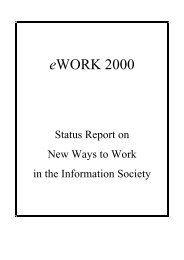Proceedings of 8th European Assembly on telework (Telework2001)
Proceedings of 8th European Assembly on telework (Telework2001)
Proceedings of 8th European Assembly on telework (Telework2001)
Create successful ePaper yourself
Turn your PDF publications into a flip-book with our unique Google optimized e-Paper software.
228The Knowledge Ec<strong>on</strong>omy and SustainabilityLennart Forsebäck, Managing Director FörsebäcIT & Euro Intelligence AB, SwedenIt is today widely recognised that achieving sustainability without the use <str<strong>on</strong>g>of</str<strong>on</strong>g> ICT soluti<strong>on</strong>s will notbe possible. However, there are no automatic links between use <str<strong>on</strong>g>of</str<strong>on</strong>g> ICT and sustainability. Quite<strong>on</strong> the c<strong>on</strong>trary there are risks <str<strong>on</strong>g>of</str<strong>on</strong>g> so-called “rebound effects”. As a matter <str<strong>on</strong>g>of</str<strong>on</strong>g> fact the c<strong>on</strong>necti<strong>on</strong>between ICT and sustainability is complex and research in the field is still in its infancy.Studies <str<strong>on</strong>g>of</str<strong>on</strong>g> some major fields where ICT can c<strong>on</strong>tribute in achieving sustainability all indicate agreat potential. Examples can be found in such areas as dematerialisati<strong>on</strong>, substituti<strong>on</strong>, improvedefficiency <str<strong>on</strong>g>of</str<strong>on</strong>g> transports and road informatics, improved efficiency <str<strong>on</strong>g>of</str<strong>on</strong>g> producti<strong>on</strong> and planning aswell as energy savings in homes and commercial premises. These opportunities are illustratedin the reports “Case studies <str<strong>on</strong>g>of</str<strong>on</strong>g> the Informati<strong>on</strong> Society and Sustainable Development” and“The Knowledge Ec<strong>on</strong>omy and Climate Change”. Both reports are published by the <str<strong>on</strong>g>European</str<strong>on</strong>g>Commissi<strong>on</strong>.It is also evident from these studies that a decreased envir<strong>on</strong>mental impact very <str<strong>on</strong>g>of</str<strong>on</strong>g>ten resultsin increased efficiency and pr<str<strong>on</strong>g>of</str<strong>on</strong>g>itability, improved quality in products, cost savings etc. Thus,sustainability might seem to be “business <str<strong>on</strong>g>of</str<strong>on</strong>g> the business”. However, from a general point <str<strong>on</strong>g>of</str<strong>on</strong>g> viewthis is obviously not the case.The potential obviously will not be fully realized unless society’s incentives structure changes, i. e.taxes, b<strong>on</strong>uses etc. but probably also legislati<strong>on</strong>. E-work is just <strong>on</strong>e example here. Why is it todayalmost impossible to make tax deducti<strong>on</strong>s <strong>on</strong> costs for an extra room for work at home, while it isnot <strong>on</strong>ly accepted but as a matter <str<strong>on</strong>g>of</str<strong>on</strong>g> fact str<strong>on</strong>gly encouraged by ec<strong>on</strong>omic subsidies to travel towork 5 days a week with a private car?The word “eco” comes from Greece and means home. Today we have two sciences, ec<strong>on</strong>omy andecology, which obviously do not have very much in comm<strong>on</strong>. But we have just <strong>on</strong>e “eco”, <strong>on</strong>ehome, <strong>on</strong>e planet. Perhaps it is not realistic today to create <strong>on</strong>e comm<strong>on</strong> discipline. However itwould be a big step forward if we could at least try to use a comm<strong>on</strong> language. A comm<strong>on</strong> languagewhere terms like pr<str<strong>on</strong>g>of</str<strong>on</strong>g>itability, ec<strong>on</strong>omic development, surplus, deficit etc. could also include theecological aspects.The knowledge ec<strong>on</strong>omy gives an opening here. Unlike in traditi<strong>on</strong>al ec<strong>on</strong>omic theory the c<strong>on</strong>cept<str<strong>on</strong>g>of</str<strong>on</strong>g> scarcity has no relevance in the knowledge ec<strong>on</strong>omy. C<strong>on</strong>trary to land, traditi<strong>on</strong>al labour, naturalresources and other limited resources knowledge is inexhaustible. It may be used by severalcompanies or individuals simultaneously. And knowledge may be used to produce even moreknowledge. The more we use it and pass it <strong>on</strong>, the more it proliferates, the more it grows.








